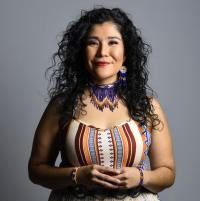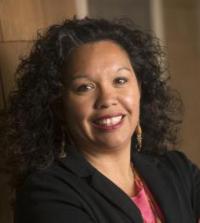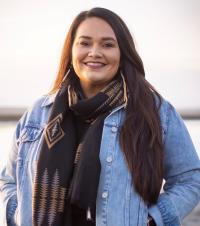Opening Keynote: Tanaya Winder
“Words as Seeds: Uncovering Your Heartwork”
How do words shape and mold us into the people we become? When we think of words as seeds, we become even more aware of the intention behind words that are planted with positivity and those that cause harm. In this talk, you’ll hear testimony on the power of words and their impact on our spirit’s journey to unearthing our passion and heartwork.

Tanaya Winder, M.F.A., is an author, singer, songwriter, poet, motivational speaker and educator who comes from an intertribal lineage of Southern Ute, Pyramid Lake Paiute, Diné and Duckwater Shoshone Nations where she is an enrolled citizen. Her heritage also includes African American. Tanaya’s performances and talks emphasize the importance of “heartwork”—the life path one is meant to follow by using one’s gifts and passions. She blends storytelling, singing, and spoken word to teach about different expressions of love (self love, intimate love, social love, community love, and universal love). She is the director of the University of Colorado Boulder’s Upward Bound program; during her 10 years there she has served hundreds of Indigenous youth. She also co-founded Sing Our Rivers Red’s Missing and Murdered Indigenous Women (MMIW) earring exhibit. Tanaya believes everyone has a gift they’ve been placed on this earth to share.
Learn more about Tanaya Winder by watching these videos: Igniting Healing: Tanaya Winder at TEDxABQ and Poet Tanaya Winder Performs “Stone Mother”.
Day 1 Evening Keynote: Lyla June Johnston
“Traditional Community Care Strategies”
Throughout Turtle Island, many ancestors from many different Indigenous Nations had refined mechanisms for maintaining health, happiness and unity in our communities. This included Creation stories, linguistic terms, ceremonies, peacemaking processes, traditional foods/medicines, sports and kinship roles. This talk will discuss some of these traditions with the overall message that most of the answers to our problems are right here in our languages, cultures and traditions.

Lyla June Johnston is an Indigenous public speaker, artist, scholar and community organizer of Diné (Navajo), Tsétsêhéstâhese (Cheyenne) and European lineages from Taos, New Mexico. Her messages focus on Indigenous rights, supporting youth, traditional land stewardship practices and healing inter-generational and inter-cultural trauma. She blends undergraduate studies in human ecology at Stanford University, graduate work in Native American Pedagogy at the University of New Mexico, and the Indigenous worldview she grew up with to inform her perspectives and solutions. Her internationally acclaimed presentations are conveyed through the medium of poetry, music and/or speech. She is currently pursuing a doctoral degree at the University of Alaska, Fairbanks in Indigenous Studies with a focus on Indigenous Food Systems Revitalization.
Day 2 Keynote: Michelle Villegas-Frazier
“A Sneak Peek into the UC Davis Native Nest!”
Join us to learn more about the Native American Academic Student Success Center, also known as the Native Nest! Given the rich diversity of our Indigenous community, we strive to make UC Davis a place where all identities are celebrated, honoring students’ achievements and supporting their personal and academic journeys. The Native American Academic Student Success Center (NAASSC) focuses on creating a sense of belonging for Native American students in a culturally appropriate way. Michelle Villegas-Frazier will discuss more about the center, highlighting the resources they provide to enhance student success, the culturally relevant activities, and its support network. Our youth are our future! Our hope is that this keynote will inspire positive change, culture shifts and community building!

Michelle Villegas-Frazier, Pomo, Pinoleville, currently serves as director of Strategic Native American Retention Initiatives/Student Affairs at the University of California, Davis. She previously worked for a decade in outreach programs on campus, returned to become the first director of Strategic Native American Retention Initiative in Student Affairs. She brings with her more than 20 years of experience in Native American outreach and retention services and programs. Villegas-Frazier provides strategic leadership to identify opportunities for enhancing the persistence, achievement and college graduation rates for Native American students.
Day 3: Keynote: Heather Hostler
“Working Together for a Common Goal: Tribal TANF and Indian Legal Services”
Heather Hostler, executive director for the California Indian Legal Services (CILS), will discuss ways for legal aids and tribal organizations to build strong partnerships and identify how to best serve tribal communities through this unique alliance of goals. There are great opportunities for Tribal TANF programs and Native American legal aids to work together to best serve their clients, who are likely income eligible for both programs. She will discuss understanding the needs of the clients, where there is intersectionality and a well-coordinated approach to deliver resources. CILS is embarking on a new strategic plan and exploring dynamic partnerships, of which Tribal TANF and Indian Health Clinics are a priority.

Heather Hostler is a member of the Hoopa Valley Tribe located in far northern California and the executive director for the California Indian Legal Services. She has an extensive background working in the California Executive Branch as a gubernatorial appointee under two administrations. Governor Brown appointed Hostler in 2012 to serve as Chief Deputy Tribal Advisor, working with the first Tribal Advisor to implement Executive Order B-10-11. In 2019 Hostler was appointed by Governor Newsom as the first Director of Tribal Affairs for the California Department of Social Services. She was the visionary leader who established the Office of Tribal Affairs (OTA). She is a dynamic change-maker, and her leadership resulted in the integration of Tribal impact considerations in policies, regulations and legislation. Prior to her work in Sacramento, she had the benefit of working for her own Tribe and serving as a Program Officer for the Humboldt Area Foundation, where she was able to support grassroots movements, community organizing and important regional collaborations.
